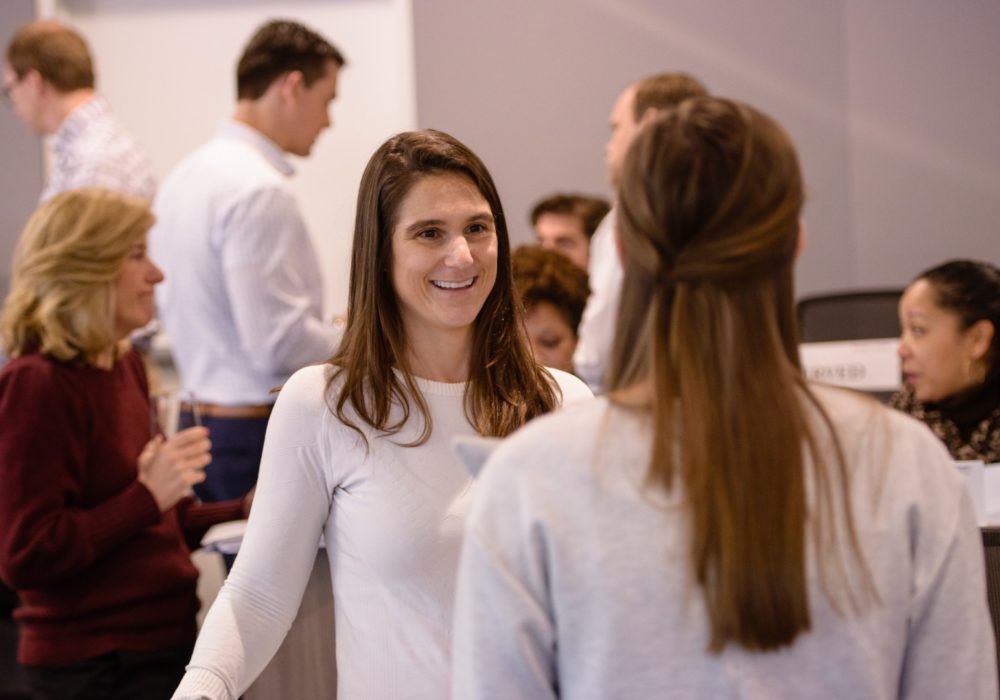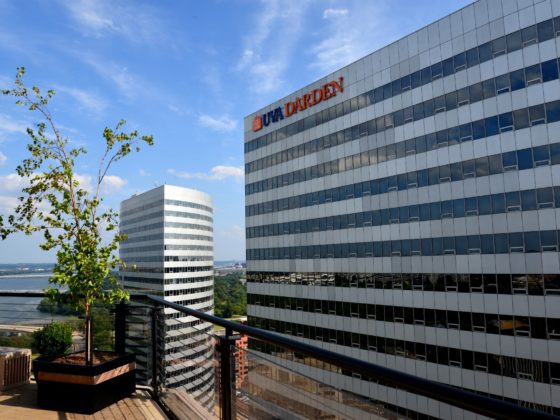Last week at UVA Darden DC Metro, Darden Admissions hosted its second annual Executive MBA Women’s Career Discovery Event. This event highlights the potential impact of an MBA through personal stories and conversation.
The night kicked off with a networking reception, followed by a panel discussion. The panel was moderated by Connie Whitaker Dunlop, who leads the program’s “Professional Advancement Course,” and featured panelists with a broad range of career goals and paths.
The panelists included:
- A career switcher who has changed jobs twice (once during and once after the program) to gain broader exposure in her industry
- A potential switcher who is evaluating next steps, including a move to a career focused on energy and the environment
- An entrepreneur launching a fitness/lifestyle company
- A climber who became a switcher during the course of the program, landing a strategy role with a Fortune 100 company
At Darden, students are typically considered to be in one of the following career buckets:
- Switchers: Students who wish to change function and/or industry, typically outside of their current employer. This is the largest group of students in our Executive MBA program.
- Climber: Students seeking to move up within their existing company.
- Entrepreneur: Students seeking to launch their own ventures or grow an existing business
We work with each student to understand their unique story and goals and to develop a personalized career plan, but we find this bucket system can be helpful as students orient toward their desired career outcome. Students can be in more than one of these buckets at a time, and students’ career interests and plans will often evolve over the course of their time in the program.
In addition to the stories shared during the event, the evening also featured a wealth of advice and insights.
Here were three of our favorite takeaways from the event:
- If you are interested in an MBA … just do it! Several of the panelists noted the methodical approach they took to their MBA research process. Years went by as they tried to decide if it was the right time for them to go back to school. The panelists shared that if they had to do it over again, they would have applied sooner. Lives and schedules only get more complicated with each passing year. Waiting a year is the difference between starting a program and being one year into (i.e., halfway through) a program.
- The program prompts introspection. Most people pursue an MBA because of technical gaps or to achieve specific career goals. But all of the panelists noted how much Darden’s Executive MBA program forced them to think about bigger questions: Who are you? What are your strengths? What are your weaknesses? What does meaningful work look like? What is your relationship to work? This introspection is an intentional product of the program’s curricular design, but also the broader culture of the program. All of the panelists noted that this personal questioning shaped their career plans and goals. Which brings us to our final point …
- Be open. The only constant in life is change. All of the panelists mentioned how their career goals and timing evolved during their time in the program. However, they also cited the considerable support they received at every turn in this winding process. Throughout the panel there were mentions of one-on-one whiteboard sessions, drafts (and re-drafts) of resumes and the School’s many career-related resources, including the “Professional Advancement Course,” the “Leadership Coaching” elective and the Batten Institute for Entrepreneurship and Innovation‘s deep entrepreneurial offerings.
While it’s important to understand why you want to pursue an MBA and what you hope to accomplish after graduation, know that your plans will continue to change. This is not so surprising when you consider that you are surrounded by classmates with work experiences different than your own, you’re learning all sorts of new and interesting things, and you are in a program that sets “transformational learning” as its goal. Embrace the journey!
Check out faculty thought leadership published on Ideas to Action. And stay connected with us via social media: Facebook, Instagram, LinkedIn, Twitter, WeChat





